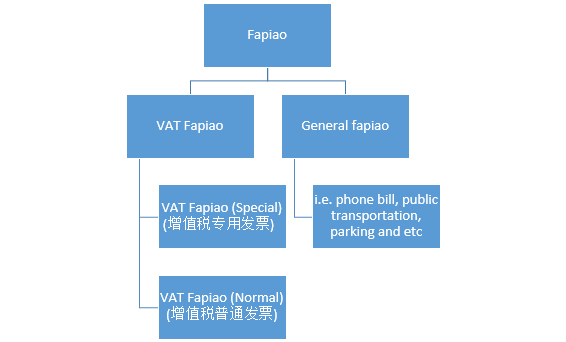In China, invoices (or “fapiao” in Chinese) are the way in which the government monitors the tax paid on any transaction. Fapiao are printed, distributed, and administrated by tax authorities, and taxpayers are required to purchase the fapiao they need from the tax authorities according to their business scope.
Fapiao can mainly be sorted into two categories – general fapiao and value-added tax (VAT) fapiao. Although these terms are often used interchangeably as they are both called Fapiao, there are notable differences between the two.
First, the VAT fapiao can be used for tax deduction purposes, while the former cannot. Second, as the VAT fapiao is used for tax deduction purposes, it will contain a lot more details with respect to the trader’s information, including tax number, address, telephone number, bank account information. Finally, the purchase amount on a VAT fapiao is usually explicitly broken down into its non-tax and tax components, while the amount shown on the general fapiao is usually a tax-inclusive figure.
Approved by the State Council, since May 1st 2016, the Ministry of Finance and State Administration of Taxation have been promoting the implementation of the Value-added Tax (VAT) reform. Starting from that date, the Business Tax has been cancelled and replaced by VAT. The Tax reform covers the whole mainland China. As such VAT Fapiao applies to all vendors, merchants, online shops, and etc. located in China.
Value-added tax (VAT) Fapiao can be further sorted into two types - VAT Fapiao (Special) (增值税专用发票) and VAT Fapiao (Normal) (增值税普通发票). In most cases, you should be able to get VAT fapiao from merchants, however, general fapiao are still available in some type of business, for example, phone bill, public transportation, parking and etc. The university will benefit from the VAT Fapiao (Special) because the VAT input amount on VAT Fapiao (Special) may be credited against the total VAT liability, and therefore reduce the University's tax burden and cash flow.

In most cases, vendor will give customer one sheet invoice (invoice copy) for VAT Fapiao (Normal) and two-sheet invoice (deduction copy and invoice copy) for VAT Fapiao (Special).
It should be noted that the responsibility to obtain a fapiao lies with the consumer, as a fapiao will not always be offered voluntarily. However, by law all businesses are required to produce a fapiao at the customer’s request at the time of purchase. In case if the merchant is not able to provide a fapiao at the time of purchase, it should be mailed asap. In the meantime, a receipt with merchant's contact information should be hold for the proof of purchase.
Please click here for some examples of Fapiao you may receive from regular business.

